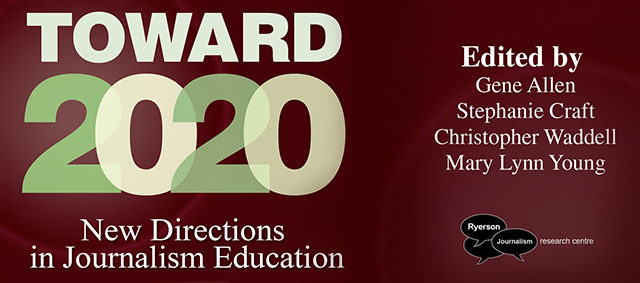By ILINA GHOSH
Staff Reporter
The future of journalism education is the focus of a new collection of essays just published by the Ryerson Journalism Research Centre.
As waves of change transform the news industry, the papers in Toward 2020: New Directions in Journalism Education grapple with where journalism education should go from here and concludes it needs to change substantially and quickly, says Ryerson University journalism professor Gene Allen.
“I think in the past, if you had been a journalist for 20 years, then you would come and teach kids what you had done in the newsroom and that made sense for a long time because the profession was very stable,” said Allen, who edited the publication along with University of Illinois associate journalism professor Stephanie Craft, University of British Columbia associate journalism professor Mary Lynn Young and Carleton University associate journalism professor Christopher Waddell.
Those days, Allen notes, are gone: “Now that things are changing so fast, a lot of people who teach journalism, who spent a long time as working journalists, are realizing that their own experiences as professional journalists are an important foundation, but not the only thing they need to teach.
“If I came into a classroom and started teaching like it was 1985, that wouldn’t be very useful,” Allen said.
The 12 essays in Toward 2020 are based on presentations delivered at a conference held at Ryerson University last year. More than 100 journalism educators from Canada, the United States, Europe and Australia attended the event and the papers represent a cross-section of the ideas discussed.
“Most of the essays operated on a conceptual level, that we [as journalism educators] generally need to rethink what we’re doing and rethink what journalism is,” Allen said.
In her essay, award-winning CBC journalist and Mount Royal University journalism professor Sally Haney argues that deadline-driven daily journalism is often characterized by an absence of self-critical reflection.
Longtime Radio-Canada journalist and University of Quebec journalism professor Chantal Francoeur scrutinizes journalism’s claim to independence from public relations practitioners.
Jordan Press, a Canadian Press national affairs reporter and the only working journalist among the authors, urges journalism educators to connect with and teach news literacy to students outside their departments.
The collection also includes two essays by Ryerson School of Journalism faculty. Ivor Shapiro’s essay questions whether the main goal of journalism programs is, or should be, to prepare students for careers as professional journalists.
“Journalism is an approach to knowledge, not just a job,” he writes, “and journalism education is therefore about teaching a distinctive epistemology that enjoys broad professional utility.”
Associate professor Gavin Adamson, in the only paper that explicitly addresses the possibilities of new journalistic forms, suggests that short online videos, presented in a live blog format, offer great potential for audience engagement.
Allen said that the tone for the volume is set in the opening essay drawn from the conference keynote address by Robert Picard, research director of the Reuters Institute of Journalism at Oxford University.
In his concluding remarks, Picard said none of the old rules apply anymore: “Journalism education can only survive and succeed if it becomes much more aggressive in seeking change. It has to become far more innovative than it ever has been. It is not a matter of thinking outside the box, because the box no longer exists. What is required is deciding what will replace the box or how to get along without one.”

